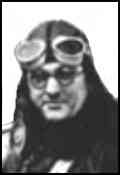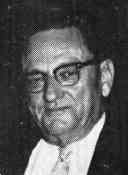 |
 |
||
| Leslie Irvin, 1919 | Leslie Irvin, 1966 |
|
1919 In 1919 Leslie Irvin made the first ever free fall parachute descent. What became known as the Irvin parachute gained rapid acceptance, and by the early 1930's was in service with some 40 air forces around the world. 1931 In the winter of 1931, I went to Europe with G. E. Brodie, an executive of Packard. We went by train to New York, by ship to Bremershaven and by train thru Germany to Prague, Czechoslovakia. I contacted Walters & Company who had bought a Packard 980 diesel and installed it in a high wing monoplane. Korda, president of Walter Co., and Etena Compara, engineer, watched the plane and engine during the test. I took one ride with Korda and visited his home where I met his wife, mother, father and inlaws. We had hassenpfeffer for dinner. Later, I watched while the engine was torn down for inspection. .We continued to Milan, Italy, thru Austria, where they were to place the Packard Diesel on a test stand. The stand wasn't ready, so we went on to Zurick, Switzerland, then to Paris, France and finally to London, England. I spent Christmas with Les Irvin (Irvin Parachutes) and his wife in their home near London. 1936 According to the Early Bird's Membership List, Leslie Irvin is to be found at the Irving Parachute Co., Icknield Way, Letchworth, Herts, England. 1940 He was a member of the Caterpillar club having been shot down by Anti Aircraft fire on 13.6.1940 and there is a letter stating this signed by Leslie Irvin of the Irvin Airchute Company. He was involved in a variety of jobs including Parachute drops, evacuation of casualties. 1966 Fifteen Los Angeles Early Birds with some of their wives gathered at the Nicabob Restaurant in Los Angeles, for a regional meeting on Friday night, June 9th. Fifty year E. B. Solo Plaques were presented to Ex-Pres. Warren Eaton (June 2, 1909) and Leslie L. Irvin, (Aug. 11, 1911). Leslie Irvin's qualification came thru the solo piloting of a free gas balloon. His early experiments with parachutes culminating in the Irvin pack type parachute are well known. In commenting thereon, Les ascribed the success of the pack-type not only to his own efforts, but to that of many others whose work had contributed to a finally successful and worthwhile life-saving device. He estimates (From available records) that between nine and ten thousand lives have been saved by the pack type chute. His big lament is that whereas his work and those of his contemporaries was for the saving of lives; the emphasis today seems to be on utter destruction. Back 

|